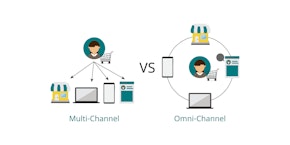Multi channel strategy and logistics

The customer is king and, what's more, they are spoilt by e-commerce giants such as Amazon. Nowadays, online platforms and services are measured against the service offered by Amazon. Same-day delivery, the choice of delivery time windows, click and collect and low or no shipping costs are examples of today's e-commerce service standards. The online giant is now also investing in physical touchpoints, such as the clothing shop Amazon Style (1) in Los Angeles. Amazon is in the process of building a multi-channel or omni-channel strategy for selected markets.
Multi, cross or omni channel?
What exactly is a multi-channel logistics strategy? What advantages does it bring or what problems does it solve? A multi-channel business strategy is when trade is conducted via different marketing and sales channels. These channels are separate from each other and the buying process isn‘t extended across channels.
The sales and marketing channels exist both physically (stores) and online (website, social media, email, computer & mobile). To ensure that the different sales channels do not compete with each other, companies try to make offers and prices the same across platforms, at least in theory. Both the technical systems and the payment processing are channel-specific. To process orders received from different channels with the same speed and quality, companies require multi-channel logistics.
A cross channel strategy is a step further than multi-channel in that customers can easily switch or cross between channels and the company can pass customer and sales data between channels.
The channels are inter-connected in a cross channel strategy and omni-channel (2) takes it a step further by using elements of the multi and cross channel strategy. All the company’s points of contact (touchpoints) with the customer are controlled centrally, usually via their web shop. It also uses different sales channels in parallel. All information is made available to the target groups across all channels. In addition, customer information held by one channel may be used across all other channels. Omni-channel thus means the complete and consistent merging of all channels.
Benefits of multi channel business
It is widely accepted that a multi-channel strategy has many advantages. First of all, sales opportunities can be expanded enormously, by opening an online shop, a wider geographical market can be reached. New sales opportunities arise and new target groups can be targeted. An online shop is open 24 hours a day, 7 days a week so there are no limitations on when customers can buy. Product information can be permanently available by establishing an FAQ section to answer the most important questions and orders are forwarded immediately without needing to visit a physical store or calling a service helpline.
Synergies become possible when the online channels also advertise the physical shops and the shops also promote the online options. Through the new sales channels, a company can collect more and more data about customers‘ buying patterns and preferences and evaluate it using artificial intelligence (AI). In this way, customers can be clearly divided into target groups and be specifically targeted by marketing.
Despite the advantages, a multi channel strategy presents challenges in that establishing and maintaining multiple sales channels is time-consuming and costly. Therefore, companies should focus on a few selected channels that correspond to their identified target groups. In addition, a suitable multi-channel logistics operation is required, because the sales channels need to be monitored, controlled and supported.
However, successful companies almost have no choice, as to remain competitive, they need to embrace e-commerce and offer an online service. Therefore, they have to build an effective multi-channel or omni-channel strategy with corresponding logistics support.
Challenges of multi-channel logistics
To support different sales channels, a company needs a multi channel logistics capability. The key requirements for success are speed of delivery, visibility of inventory in all distribution channels, customer-friendly returns management, adequate IT management and channel specific product range management
The integration of online trade creates completely different framework conditions for the company and logistics. A wider product assortment becomes necessary and many, often lower value, orders are generated. The customer expects fast delivery (possibly same-day) and, at the same time, they want to choose a time window for delivery and/or the pick-up location. Logistics and intralogistics must adapt accordingly. In intralogistics, this requires a flexible, efficient storage system for fast availability of goods. It must guarantee high throughput and fast picking times at low cost. The picking of different order types needs to take place in one system. The ABC structure of the product assortment used for picking and inventory management of the different channels should not be done separately.
For the management and control of a wide range of products, it is essential to utilise a warehouse management system (WMS). For many different small orders, full automation is often not suitable in e-commerce. Partial automation by means of placement and picking robots and automated guided vehicles (AGVs) may be possible. Picking in e-commerce fulfilment centres is also frequently done by utilising multi-level shelving systems (MGA) with a high concentration of picking locations. For fast moving products, the integration of flow racks is also a popular option, as pick locations can be replenished without interrupting the picking process. Another challenging aspect of online business is an often very high returns rate which, in turn, necessitates an efficient returns logistics (3) process.